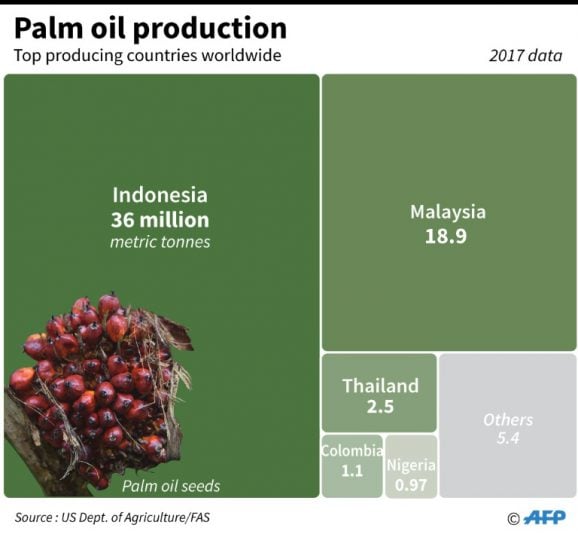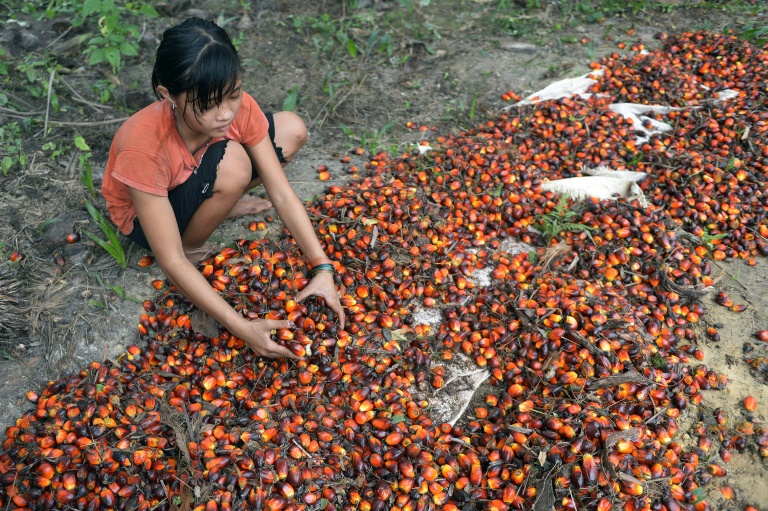Palm oil giant Indonesia is pressing the European Union to abandon plans to apply strict environmental standards to the sector and silence "negative" criticism about the commodity, documents obtained by AFP have revealed.
The papers, marked “not for publication” and for distribution only on a “need to know” basis, reflect Jakarta’s wish list for a critical industry as the two sides hammer out new rules for a trading relationship worth $35 billion a year.
Indonesia is the world’s largest producer of palm oil — used in everything from food to cosmetics — and vast swathes of rainforest have been destroyed to make way for plantations that are the backbone of Southeast Asia’s biggest economy.
This annual slash-and-burn clearing threatens endangered species and fuels annual forest fires that plague the region.
Indonesia and the EU kick off a fourth and possibly final round of negotiations — covering a wide range of trade, investment and intellectual property rules — from Monday in the archipelago nation.
The documents outline a call for the EU to apply Jakarta’s own government sustainability standard — despite serious concerns about its credibility — rather than a tougher European certification scheme that was proposed in April last year.

Palm oil production
Only a minority of Indonesian palm oil plantations currently even meet Jakarta’s relatively lax standards.
Separately, Indonesia and neighbouring Malaysia — another major palm oil producer — have slammed the European Parliament’s move to ban the use of the commodity in biofuels from 2021.
They say that the ban would devastate rural communities where many small-scale farmers survive by cultivating the crop.
Indonesia’s trade ministry declined to comment on the leaked text, which is dated June 2017.
The last round of talks were in September last year, and it is not clear if the documents reflect Jakarta’s latest position in negotiations, which began in mid-2016.
European Commission officials said they would not comment on an alleged leak. However, they said any final deal would not come at the expense of acceptable environmental or labour standards.
One passage calls for the EU to legislate against “negative” messaging and campaigns with “misleading nutrition, health and/or environmental claims”, in an apparent bid to head off criticism about palm oil’s impact.
The industry frequently accuses rival foreign vegetable oil firms of working with NGOs to launch “black campaigns” against the sector.
However, there is “no question of limiting the possibilities of any entity in the EU to inform consumers about products available in the market”, a Commission spokesman told AFP.

European officials insist any final deal with Indonesia on trade would not come at the expense of acceptable environmental or labour standards
Jakarta also wants the EU to agree that one party must compensate the other for any economic losses “due to the pursuit of sustainability”.
Environmentalists said Jakarta’s call to apply its own sustainability programme demonstrates Indonesia isn’t serious enough about addressing the ecological impact of its palm oil sector.
“The (government standard) is not sufficient enough to ensure sustainability as it allows conversion of natural forest” to plantations, environmental group WWF’s Indonesia office said in a statement after reviewing documents supplied by AFP.
“So, in our mind, (it) does not fulfil (the) EU market requirement of sustainability compliance.”






